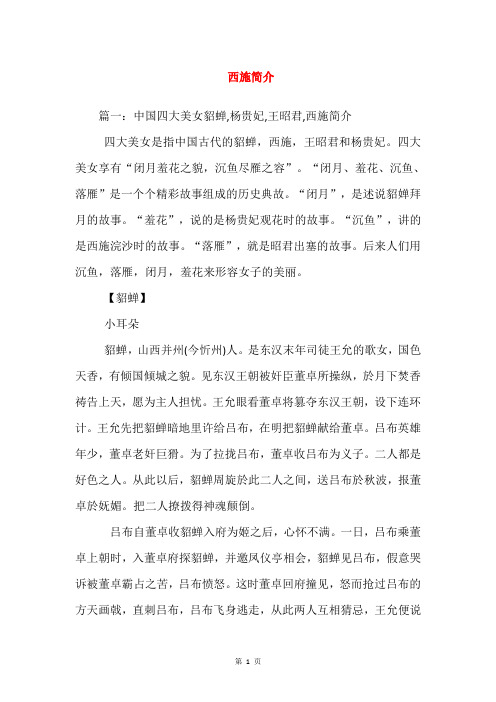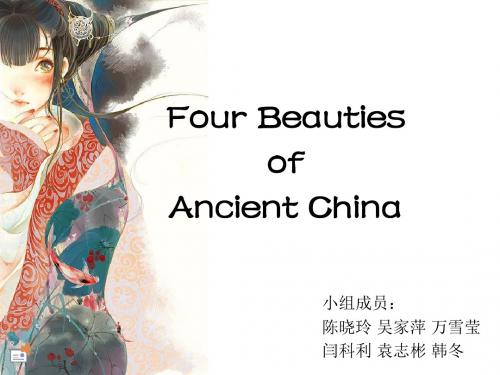西施 Xi Shi
- 格式:ppt
- 大小:3.14 MB
- 文档页数:15

西施简介篇一:中国四大美女貂蝉,杨贵妃,王昭君,西施简介四大美女是指中国古代的貂蝉,西施,王昭君和杨贵妃。
四大美女享有“闭月羞花之貌,沉鱼尽雁之容”。
“闭月、羞花、沉鱼、落雁”是一个个精彩故事组成的历史典故。
“闭月”,是述说貂婵拜月的故事。
“羞花”,说的是杨贵妃观花时的故事。
“沉鱼”,讲的是西施浣沙时的故事。
“落雁”,就是昭君出塞的故事。
后来人们用沉鱼,落雁,闭月,羞花来形容女子的美丽。
【貂蝉】小耳朵貂蝉,山西并州(今忻州)人。
是东汉末年司徒王允的歌女,国色天香,有倾国倾城之貌。
见东汉王朝被奸臣董卓所操纵,於月下焚香祷告上天,愿为主人担忧。
王允眼看董卓将篡夺东汉王朝,设下连环计。
王允先把貂蝉暗地里许给吕布,在明把貂蝉献给董卓。
吕布英雄年少,董卓老奸巨猾。
为了拉拢吕布,董卓收吕布为义子。
二人都是好色之人。
从此以后,貂蝉周旋於此二人之间,送吕布於秋波,报董卓於妩媚。
把二人撩拨得神魂颠倒。
吕布自董卓收貂蝉入府为姬之后,心怀不满。
一日,吕布乘董卓上朝时,入董卓府探貂蝉,并邀凤仪亭相会,貂蝉见吕布,假意哭诉被董卓霸占之苦,吕布愤怒。
这时董卓回府撞见,怒而抢过吕布的方天画戟,直刺吕布,吕布飞身逃走,从此两人互相猜忌,王允便说服吕布,铲除了董卓。
京剧有《凤仪亭》就是叙述这段故事的。
闭月说的是貂禅,貂婵在后花园拜月时,忽然轻风吹来,一块浮云将那皎洁的明月遮住。
这时正好王允瞧见。
王允为宣扬他的女儿长得如何漂亮,逢人就说,我的女儿和月亮比美,月亮比不过,赶紧躲在云彩后面,因此,貂婵也就被人们称为“闭月”了。
【杨贵妃】狐臭(719~756)唐代蒲州永乐人(陜西华阴县人)。
通晓音律,能歌善舞。
最初为唐玄宗的第十八子寿王的王妃,唐玄宗见杨玉环的姿色后,欲纳入宫中,着为女,号太真。
天宝四年(745)入宫,得唐玄宗宠幸,封为贵妃,(时玄宗年六十一,贵妃年二十七)父兄均因此而得以势倾天下。
贵妃每次乘马,都有大宦官高力士亲至执鞭,贵妃的织绣工就有七百人,更有争献珍玩者。

古代学者四艺、孔子六艺、四大美女学者四艺Four Arts of the Chinese Scholar–琴Guqin,---棋Weiqi,---书 Calligraphy ,---画Chinese painting儒家六艺中国古代儒家要求学生掌握的六种基本才能:礼、乐、射、御、书、数。
也称孔子六艺。
“通五经贯六艺”的“六艺”。
还有一种说法,六艺即六经,谓《易》、《书》、《诗》、《礼》、《乐》、《春秋》。
礼:礼节(即今德育)五礼:吉礼、凶礼、军礼、宾礼、嘉礼。
乐:是六乐。
六乐:指《云门大卷》《咸池》《大韶》《大夏》《大濩》《大武》六套乐舞。
射:射箭技术。
五射:白矢、参连、剡注、襄尺、井仪。
白矢,箭穿靶子而箭头发白,表明发矢准确而有力;参连,前放一矢,后三矢连续而去,矢矢相属,若连珠之相衔;剡注,谓矢行之疾;襄尺,臣与君射,臣与君并立,让君一尺而退;井仪,四矢连贯,皆正中目标。
御:驾驭马车的技术五御:鸣和鸾、逐水曲、过君表、舞交衢、逐禽左。
《周礼·地官·保氏》:"乃教之六艺……四曰五驭。
"郑玄注:"五驭:鸣和鸾,逐水曲,过君表,舞交衢,逐禽左。
"谓行车时和鸾之声相应;车随曲岸疾驰而不坠水;经过天子的表位有礼仪;过通道而驱驰自如;行猎时追逐禽兽从左面射获。
书:书法(书写,识字,文字)六书:象形、指事、会意、形声、转注、假借。
(注:转注、假借是识字方法,而象形、指事、会意、形声是造字方法,其中形声字约占百分之九十。
数:算法(计数)数艺九科:方田、栗布、差分、少广、商功、均输、盈朒、方程、勾股;九数即九九乘法表,古代学校的数学教材。
中国古代四美:西施、王昭君、貂蝉、杨玉环沉鱼落雁、闭月羞花的四大美女,除王昭君外三人都亡国了。
她们的故事似乎说明只有不慕富贵、不屈从权威才能把握自己的命运。
古代女子被利用为男人、为国家牺牲,最终还被说成亡国祸水,男权无耻。

功能目的论视角下商业广告语篇翻译研究张倩【摘要】广告语篇是典型的信息型和号召型/祈使型文本,兼具信息传递和劝说消费者的功能,因此广告翻译要兼顾这两大功能,以实现广告译文的预期目的。
功能目的论为广告译文实现这一目的提供了可行途径。
译者在广告翻译中通过补充说明、删节、改写和文化意象转换等手段,可实现广告在译语环境中推销产品或服务、劝说消费者购买的最终目的。
故功能目的论视角下的广告翻译研究,不仅有助于人们在理论上了解商业广告翻译的运作机制,对广告翻译实践也有一定的指导作用。
%Advertising discourse aims to distribute messages and persuade customers into purchasing products .Therefore ,the translation of advertising discourse should realize the two aims at the same time .Based on Vermeer’s Skopostheorie ,this paper presents how advertising discourse translation can achieve the goals of message -distribution and persuasion through various translating techniques .Typi-cal cases illustrated in this paper can promote people ’s understanding of Skopostheorie and advertising translation both in theory and practice .【期刊名称】《牡丹江教育学院学报》【年(卷),期】2014(000)004【总页数】2页(P32-33)【关键词】功能目的论;广告语篇功能;广告翻译【作者】张倩【作者单位】浙江工商大学外国语学院,浙江杭州 310018【正文语种】中文【中图分类】H315.9一、引言中国经济的快速发展使中国逐步成为世界商品经济市场中最具潜力的国家之一。

外国教授讲中国西施的故事Good afternoon, ladies and gentlemen. Today, I would like to share with you the fascinating story of one of China's most famous beauties – Xi Shi. Xi Shi's tale is not only a tale of beauty, but also a story of power, love, and tragedy.Xi Shi was born in the ancient Chinese state of Yue during the Spring and Autumn Period, around the 5th century BC. Legend has it that from a young age, Xi Shi possessed an unmatched natural beauty that captivated the hearts of all who laid eyes on her.As the story goes, during the time of Xi Shi's youth, the kingdoms of Yue and Wu were in conflict. The king of Wu, Fuchai, was known for his ambition and desire to expand his reign. Upon hearing of Xi Shi's unparalleled beauty, he devised a plan to use her as a political weapon. Fuchai decided to send his trusted advisor, Fan Li, to find Xi Shi and bring her back to Wu.Fan Li successfully located Xi Shi and was immediately mesmerized by her beauty. He agreed to serve as her mentor and prepared her for her new role as a spy. Xi Shi underwent training in etiquette, music, dance, and the art of conversation – all essential skills to win the hearts of the enemy.When Xi Shi arrived at the palace of Fuchai, she used her charm and grace to captivate him. Fuchai became infatuated with Xi Shi and was deeply enamored by her every move. As a result, his focus shifted from politics and warfare to indulging in Xi Shi's presence. Taking advantage of Fuchai's infatuation, Fan Li began advisingthe king to weaken his military forces, stating that peace should be pursued instead. With Fuchai's attention diverted and his kingdom weakened, Yue was able to regain its strength and prepare for a counter-attack.As time went on, however, Xi Shi's role as a spy began to take its toll. She fell in love with her mentor, Fan Li, who had always shown her kindness and compassion. Realizing the extent of Fuchai's tyranny and cruelty, Xi Shi grew increasingly disillusioned with her mission.Tragically, the story of Xi Shi does not have a happy ending. Fuchai eventually discovered Xi Shi's true intentions and the betrayal that had taken place. In his rage and despair, he ordered Xi Shi's execution, thus ending the life of one of the most beautiful and tragic figures in Chinese history.Xi Shi's story has been one of admiration and fascination throughout the centuries. Her beauty and allure have become legendary, and her sacrifice reminds us of the power and consequences of love, loyalty, and war.Thank you for listening to the captivating tale of Xi Shi, a woman whose beauty and tragedy continue to captivate the hearts and minds of people around the world.。


. All Rights Reserved.西施传说:苎萝浣纱女 笑颦美无敌Legend of Xi Shi文·图|陈侃章 核稿|彭先国 内容指导|浙江省委宣传部对外交流处There is no legend in the world until the emergence of the cultural memory. When a legend attaches itself to the real historical゙ gure who is a beautiful neighborhood girl, the legend is true to feel—the story of Xi Shi was born in history.世上本没有传说,有了文化记忆才产生传说。
当这种传说依附于真实的历史人物,且这个人物又是个一笑一颦、顾盼生辉的邻家女孩,那么这种传说便真切可感,伸手可及,津津乐道无穷期——西施的故事,就诞生于那段“生聚教训”的经典历史中。
西施其人春秋战国时期,吴越两国互相攻伐。
公元前494年,吴国击败越国,越王勾践入吴为人质。
勾践获释后发誓洗雪这奇耻大辱,制定兴越灭吴之策,其中第四术为“吴王淫而好色,往献美女,其必受之”。
几经寻觅,终于在诸暨苎萝山下找到超尘脱俗的西施和郑旦。
121.诸暨浣江(郭斌 摄)2.浣纱石西施,世居诸暨苎萝山下(今诸暨市城南),幼即浣纱,世称“浣纱女”,为绝世之美人。
郑旦,与西施同为苎萝山下女,亦美艳绝伦,与西施同时被选中。
勾践把她们安置到越国都城会稽(今绍兴)土城山学习宫廷歌舞礼仪,然后献送吴王。
显然,西施、郑旦是勾践送给吴王夫差极为重要的贡品。
关于西施的记载,首先散见于先秦诸子百家,如《墨子》《韩非子》等,到了两汉,提到西施的书已很多。
西施、郑旦等人在文物方面也得到印证,在绍. All Rights Reserved.兴出土的汉代“吴越人物画像铜镜”上,分别是吴王、伍子胥、越王、范蠡及越女二人。
西施的作文英文回答:Xi Shi, one of the Four Beauties of ancient China, was renowned for her extraordinary beauty and intelligence. Born during the Spring and Autumn Period (770-476 BCE), her life story is a captivating tale of intrigue, sacrifice, and enduring legacy.Xi Shi's exceptional appearance was said to be so captivating that fish would forget to swim upon seeing her, and birds would cease their flight. Her charm and grace were unparalleled, and her mere presence could evoke a sense of awe and tranquility.Beyond her physical attributes, Xi Shi possessed a keen intellect and a compassionate heart. She was well-versed in literature, art, and politics, and her wisdom and insight were highly valued by those around her.Xi Shi's beauty and intelligence made her an ideal choice for a delicate diplomatic mission. During a time of conflict between the state of Yue and the powerful state of Wu, Xi Shi was sent to the court of King Fuchai of Wu as a tribute. Her mission was to distract the king and his court, thereby weakening their defenses and ultimately leading to Yue's victory.Xi Shi's presence in the Wu court had a profound impact on King Fuchai. He was instantly smitten by her beauty and charm, and he lavished her with attention and gifts. However, Xi Shi remained loyal to her homeland and used her influence to undermine Wu's military strength.Through her intelligence and wit, Xi Shi gained thetrust of King Fuchai's advisor, Wu Zixu, who saw her as a potential ally in his own plans to weaken the king's power. Together, they devised a plan to sabotage Wu's defenses and prepare the way for Yue's invasion.Xi Shi's diplomatic mission was ultimately successful. King Fuchai, blinded by his infatuation with her, becameincreasingly negligent of his kingdom. Yue's army took advantage of this weakness and launched a surprise attack that resulted in Wu's defeat.After the war, Xi Shi returned to Yue as a national heroine. Her beauty and intelligence had played a pivotal role in securing victory for her homeland, and she was hailed as a savior by her people.However, Xi Shi's destiny took a tragic turn. King Goujian of Yue, fearing that her beauty might lead to future conflicts, ordered her to be drowned in the river. Thus, the legendary beauty met an untimely demise at the hands of the king she had once helped to victory.Despite her tragic end, Xi Shi's legacy lived on through the ages. Her image became a symbol of beauty, intelligence, and sacrifice, inspiring countless works of art, literature, and drama. She remains one of the most revered and enduring figures in Chinese history.中文回答:西施。
介绍西施故里英文作文English:West Lake, located in Hangzhou, Zhejiang Province, is considered the hometown of Xi Shi, one of the Four Beauties of ancient China. The area is filled with rich historical and cultural heritage, and it is a popular tourist destination. Visitors can explore the beautiful West Lake, which is surrounded by lush greenery, charming gardens, and iconic landmarks such as the Leifeng Pagoda. There are also various museums and historical sites that showcase the story of Xi Shi and her impact on Chinese history. In addition to the historical attractions, visitors can also enjoy local delicacies and shopping in the bustling streets of the area. Overall, West Lake is a picturesque destination that offers a perfect blend of natural beauty and cultural experiences.中文翻译:杭州位于浙江省,西湖被认为是中国古代四大美女之一西施的故乡。
西施故里风景英语作文Nestled in the lush greenery of Zhejiang province, China, lies the enchanting hometown of the legendary beauty Xi Shi. This place, steeped in rich history and culture, offers a captivating blend of natural scenery and cultural heritage.The first thing that catches the eye is the picturesque landscape, with rolling hills and lush green fields. The serene lakes and rivers reflect the blue sky and floating clouds, creating a serene and peaceful atmosphere. The air is fresh and filled with the scent of flowers and trees, making it a perfect escape from the hustle and bustle of city life.As one explores deeper into the town, one is greeted by the ancient buildings, each with their own unique story. These buildings, made of stone and wood, exude a timeless charm that takes one back to the ancient times. The cobblestone streets, narrow lanes, and traditional shops further add to the authenticity of this ancient town.The town is also famous for its tea culture. The residents here are passionate about tea, and one can find various tea houses and tea gardens scattered throughout the town. The fresh aroma of tea fills the air, inviting passersby to stop and enjoy a cup of the local specialty. Not far from the town center is the Xi Shi Temple, dedicated to the legendary beauty. This temple is a testament to the deep respect and admiration that the people of this town have for Xi Shi. Inside the temple, one can find statues of Xi Shi and other historical figures, along with intricate carvings and paintings that depict scenes from her life.Visitors to Xi Shi's hometown are also treated to various cultural performances and activities. These performances, which include traditional dance, music, and drama, allow visitors to experience the rich cultural heritage of this place.In conclusion, the hometown of Xi Shi is a must-visit destination for anyone interested in Chinese history, culture, and natural beauty. It offers a unique blend of old and new, combining the charm of ancient buildings andtraditions with the beauty of natural landscapes. From the serene lakes and rolling hills to the vibrant cultural performances, this town truly embodies the essence of China. **西施故里风景的魅力**位于中国浙江省的西施故里,风景如画,魅力四溢。
《西xī 施shī 咏yǒnɡ 》作zuò 者zhě :王wán ɡ 维wéi艳yàn 色sè 天tiān 下xià 重zhòn ɡ,西xī 施shī 宁nìn ɡ 久jiǔ 微wēi 。
朝zhāo 为wéi 越yuè 溪xī 女nǚ ,暮mù 作zuò 吴wú 宫ɡōnɡ 妃fēi 。
贱jiàn 日rì 岂qǐ 殊shū 众zhòn ɡ,贵ɡuì 来lái 方fānɡ 悟wù 稀xī 。
邀yāo 人rén 傅fù 粉fěn 粉fěn ,不bú 自zì 著zhuó 罗luó 衣yī 。
君jūn 宠chǒnɡ 益yì 娇jiāo 态tài ,君jūn 怜lián 无wú 是shì 非fēi 。
当dānɡ 时shí 浣huàn 纱shā 伴bàn,莫mò 得dé 同tón ɡ 车chē 归ɡuī 。
持chí 谢xiè 邻lín 家jiā子zǐ ,效xiào 颦pín 安ān 可kě 希xī 。
【注zhù 解jiě 】:1、持chí 谢xiè :奉fèn ɡ 告ɡào 。
2、安ān 可kě 希xī :怎zěn 能nén ɡ 希xī 望wàn ɡ 别bié 人rén 的de 赏shǎnɡ 识shí 。
【韵yùn 译yì 】:艳yàn 丽lì 的de 姿zī 色sè 向xiàn ɡ 来lái 为wéi 天tiān 下xià 器qì 重zhòn ɡ ,美měi 丽lì 的de 西xī 施shī 怎zěn 么me 能nén ɡ 久jiǔ 处chǔ 低dī 微wēi ?原yuán 先xiān 她tā 是shì 越yuè 溪xī 的de 一yí 个ɡè 浣huàn 纱shā 女nǚ ,后hòu 来lái 却què 成chén ɡ 了le吴wú 王wán ɡ 宫ɡōnɡ 里lǐ 的de 爱ài 妃fēi 。